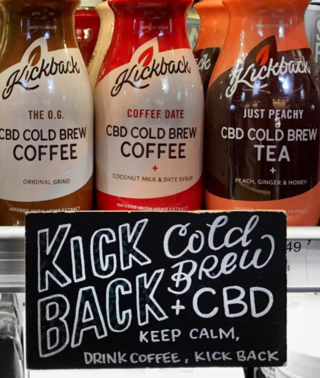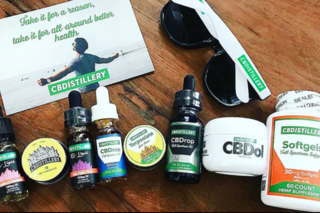CBD
Could CBD Oil Help Treat Schizophrenia?
The latest research and possible problems with the ubiquitous supplement.
Posted July 1, 2019 Reviewed by Abigail Fagan

In Massachusetts and several other states, cannabis products (with some regulation) are legal for both medical and recreational use. While cannabis as a plant has hundreds of chemicals called cannabinoids, many of which may have medicinal, toxic, or psychoactive effects, the two we know the most about are THC and CBD.
THC is known for causing the psychoactive “high” of the marijuana experience, which can extend to paranoia, but can also perhaps aid pain relief and induce sleep and relaxation, at least the short term. CBD is short for cannabidiol, and it does not cause a high. A form of CBD, Epidiolex, was recently FDA approved for the treatment of seizures associated with certain rare conditions in childhood, and is a schedule V drug (this is relatively low restriction, with schedule I being illegal things like heroin, and schedule II being many prescription opiates and stimulants with higher potential for abuse).
Hemp-derived CBD oil is also sold as Hemp oil in all sorts of forms over the counter with almost no regulation and at dispensaries in states that have them. You can get anything from gummies to drops to vape oils to dog biscuits. Unless you get the oil from a regulated dispensary (or are somehow prescribed the FDA-approved version), it’s unclear how much CBD oil is actually in the product you are consuming. The real stuff tends to be expensive ($70-120 for a couple of ounces). Another very important thing to know is that cannabis oil, available from dispensaries, is not the same as CBD or cannabidiol oil, and is usually very high in THC. You absolutely do not want to mix up these two substances.

Patients often ask me about medical marijuana. I advise my patients with a family or personal history of bipolar disorder and schizophrenia to avoid THC, to avoid most of the over-the-counter products except, perhaps, from a regulated state dispensary as we don’t know what’s in that bottle of hemp oil you bought on Amazon, and that there is very little data about CBD for any psychiatric condition. However, more information will be coming like water out of a fire hose. At clinicaltrails.gov there are over 560 registered studies of CBD for various medical conditions.
Because much of the early research showed that CBD probably attenuated the psychotic effects of THC in different strains of marijuana, most of the completed studies of CBD have been in schizophrenia as an additional treatment on top of standard medications and therapies. The largest was of a randomized controlled trial of 88 people by McGuiare et al showing significant improvement in cognitive processing and lower levels of psychotic symptoms such as hallucinations.
Another study of 42 people back in 2012 also showed some benefit for improving both hallucinations/delusions and disordered thinking in schizophrenia. A study of 36 folks with chronic, stable schizophrenia symptoms on a somewhat lower dose of CBD showed no difference between CBD and placebo with either positive effects or any bad side effects other than a little sedation. All told that’s less than 200 people. It's certainly interesting, perhaps even promising, and while we don’t know precisely how it works, it doesn’t seem to work like any of the other medications used for schizophrenia, and it also doesn’t have many of the side effects of other meds (though without long term studies, we can’t assess longer-term side effects).
What are the downsides of CBD, besides the expense and the very real possibility of confusing it with cannabis oil? FDA-approved Epidiolex has a warning to watch for liver damage, and large amounts of CBD in mice is toxic to the liver (by a lot, compare 20 mg/kg recommended dose of Epidiolex to 614 mg/kg that typically induced liver damage in the mice. So if you have the means to purchase large amounts of CBD oil, I certainly would not recommend drinking 30 grams of it at a time.
One additional problem exists with CBD. It is a strong cytochrome p450 3A4 inhibitor, which means it has the potential to slow the metabolism (thus increase the dose, perhaps to toxic levels) of 60% of common medications, including many benzodiazepines, antipsychotics, opioids, antibiotics, heart medications, and even meds for organ transplant rejection (see the list of “substrates” on this Wikipedia page.) While that hemp oil gummy you get at the gas station might have 0-1% CBD (but who knows how much?), a stronger product could cause some real problems for people on many different types of medications. As these supplements become more popular and it's likely there will be some competition between CBD products at the dispensaries vs the FDA approved forms which will be covered in warnings about interactions, it’s very important for doctors and pharmacists to know about these issues.
The takeaway is that CBD has real potential to help people with psychiatric conditions, even something as difficult and chronic as schizophrenia. But we have to wait for the science to catch up to any hype before we know for sure.
Copyright Emily Deans MD


